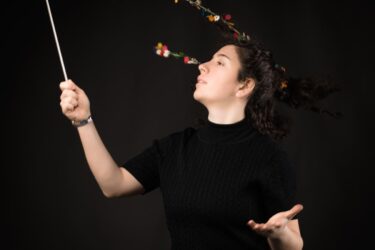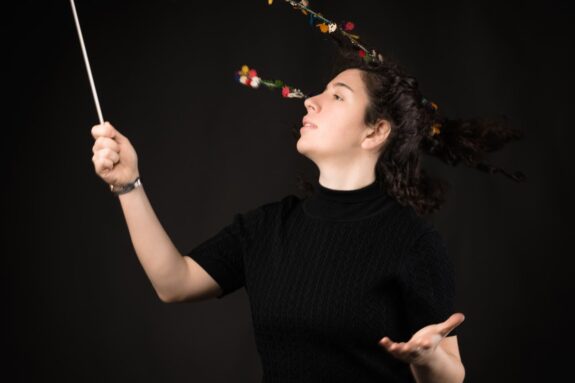 United Kingdom Dancing and Deities: Olivia Boen (soprano), Teresa Iervolino (mezzo-soprano), Levy Sekgapane (tenor), Ashley Riches (bass), BBC National Chorus and Orchestra of Wales / Nil Venditti (conductor). Hoddinott Hall, Millennium Centre, Cardiff, 21.11.2024. (PCG)
United Kingdom Dancing and Deities: Olivia Boen (soprano), Teresa Iervolino (mezzo-soprano), Levy Sekgapane (tenor), Ashley Riches (bass), BBC National Chorus and Orchestra of Wales / Nil Venditti (conductor). Hoddinott Hall, Millennium Centre, Cardiff, 21.11.2024. (PCG)

Rossini (arr. Respighi) – La Boutique fantasque: Suite
Rossini – Stabat Mater
Gioachino Rossini’s retirement from the operatic world after William Tell in 1830 was widely regarded by his contemporaries as bidding a final farewell to music. But, as we now know, he was far from idle afterwards. He not only penned a number of major choral works but a whole series of trifles which he described dismissively as ‘sins of my old age’. Later composers have seized upon those with whoops of glee as basic material for further development and exploration. These scavengers have included Glazunov and, even more surprisingly, Britten, but the best-known must surely be Ottorino Respighi, who concocted from these delightful miniatures a complete ballet for Diaghilev’s Ballets Russes.
It was an excellent idea to couple a suite from this score with the Stabat Mater. Rossini wrote it in instalments between 1832 and 1842, a forerunner of his ironically entitled Petite messe solenelle which, as was correctly observed even in the composer’s lifetime, was neither little nor solemn. Neither is the Stabat Mater, even if its opening movement may be unwontedly gloomy and tempestuous for the composer. The central display arias for the soloists have all the joy and élan found in his operas, and their reckless hedonism is a welcome contrast to the earnestly contrapuntal output of many nineteenth-century writers for the voracious choral amateur tradition. Indeed, Rossini scrupulously avoids the fugues, endemic in the later oratorios of the nineteenth century. The solitary lapse from grace is a treatment of the Amen that he abandons before it has fully run its course.
Nor was there was anything amateur here about the singing of the BBC Welsh chorus, some hundred voices in all, who raised the roof in the loudest and most dramatic passages. They even managed to bring off the long unaccompanied Eius Mater – with its many difficulties of chromatic modulations – and never allowed themselves to drift off pitch. One wonders how the French choirs of the period managed in pages such as this or similar sections in choral works by Cherubini and Berlioz; to judge by Berlioz’s acerbic comments, one suspects not always too successfully. Rossini’s writing may be unkind to the voices in such passages, but the enthusiasm and evident enjoyment of these singers paid real dividends.
The quartet of vocal soloists, each with showpiece solo arias in addition to the combined passages, were well balanced; they did well with extremely tricky unaccompanied modulations in the over-extended setting of Quando corpus. Olivia Boen, a pearl of a soprano, was slightly overwhelmed by the choral and orchestral forces at the climax of her Inflammatus (the accompaniment Rossini enthusiastically marked tutta forza). Even so, she produced creamy tones and delicate phrasing that were a constant delight. Levy Sekgapane was similarly challenged by Rossini’s often heavy accompaniment (one easily forgets how sheerly noisy his music can be). Still, his suave delivery of Cuhus animam managed the perilous ascent to a high D-flat with aplomb and deceptive ease. Ashley Riches, too, did not quite dominate Rossini’s brass in Pro peccatis. Teresa Iervolino, however, coped well with a part where Rossini tended to neglect the contralto register in favour of higher-lying lyricism. All of the singers showed themselves well capable of handling the composer’s sometimes elaborately decorated lines but could not avoid the occasional moments when the bouncing rhythms threatened to teeter over into the realm of opera buffa, a danger that Rossini himself well realised.
Composers in the twentieth century who extracted suites from their ballet scores have tended to present complete scenes (if with some abridgement or adaptation, as variously with Ravel, Stravinsky or Bartók). Respighi in La Boutique fantasque returned to the earlier practice of Delibes and Tchaikovsky: he simply took individual numbers from the whole, occasionally indeed making further internal cuts in the music. This risks reducing the single movements to something more akin to ‘light music’ in the commercial style, but Respighi is far too expert a handler of the orchestra to permit such comparisons to be sustained for long. Conductor Nil Venditti correctly recognised the delicately applied touches of celesta and harp; she requested specific applause for Catherine Roe Williams and Elen Hydren. Throughout the evening, she showed every sympathy with Rossini’s sense of fun and style.
One may have, perhaps irreverently, been reminded of Diaghilev’s reaction to Stravinsky’s Pulcinella which, the composer alleged, reflected an ‘affronted eighteenth century’. One cannot, however, imagine Rossini to express anything but delight in Respighi’s similarly modernised versions of his tunes, in a manner that prefigures later similarly enjoyable treatments of Sullivan and other nineteenth-century composers by such as Mackerras and Lanchbery. The witty title Dancing and Deities contrived for the evening was fully justified by the sparkling treatment meted out to the composer’s post-operatic pieces.
The concert was relayed live on BBC Radio 3 and will be available on BBC Sounds for a further month. The programme also indicated that the event was being filmed for a later release in the BBC NOW Concert Series.
Paul Corfield Godfrey
